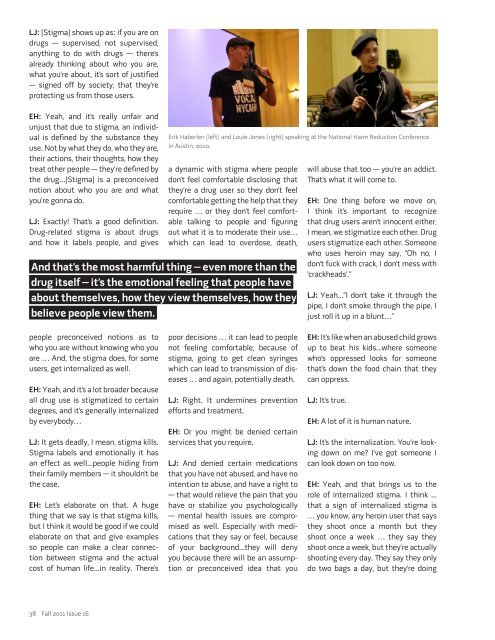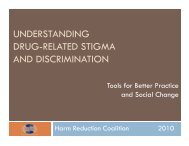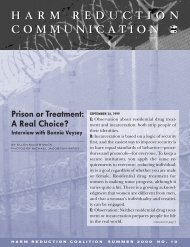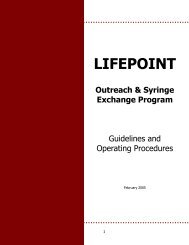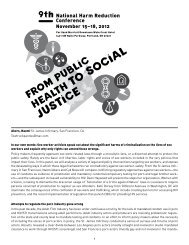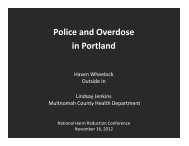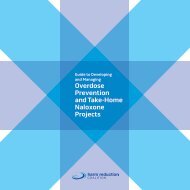the PDF here - Harm Reduction Coalition
the PDF here - Harm Reduction Coalition
the PDF here - Harm Reduction Coalition
You also want an ePaper? Increase the reach of your titles
YUMPU automatically turns print PDFs into web optimized ePapers that Google loves.
LJ: [Stigma] shows up as: if you are on<br />
drugs — supervised, not supervised,<br />
anything to do with drugs — <strong>the</strong>re’s<br />
already thinking about who you are,<br />
what you’re about, it’s sort of justified<br />
— signed off by society, that <strong>the</strong>y’re<br />
protecting us from those users.<br />
EH: Yeah, and it’s really unfair and<br />
unjust that due to stigma, an individual<br />
is defined by <strong>the</strong> substance <strong>the</strong>y<br />
use. Not by what <strong>the</strong>y do, who <strong>the</strong>y are,<br />
<strong>the</strong>ir actions, <strong>the</strong>ir thoughts, how <strong>the</strong>y<br />
treat o<strong>the</strong>r people — <strong>the</strong>y’re defined by<br />
<strong>the</strong> drug…[Stigma] is a preconceived<br />
notion about who you are and what<br />
you’re gonna do.<br />
LJ: Exactly! That’s a good definition.<br />
Drug-related stigma is about drugs<br />
and how it labels people, and gives<br />
Erik Haberlen (left) and Louie Jones (right) speaking at <strong>the</strong> National <strong>Harm</strong> <strong>Reduction</strong> Conference<br />
in Austin, 2010.<br />
a dynamic with stigma w<strong>here</strong> people<br />
don’t feel comfortable disclosing that<br />
<strong>the</strong>y’re a drug user so <strong>the</strong>y don’t feel<br />
comfortable getting <strong>the</strong> help that <strong>the</strong>y<br />
require .. . or <strong>the</strong>y don’t feel comfortable<br />
talking to people and figuring<br />
out what it is to moderate <strong>the</strong>ir use.. .<br />
which can lead to overdose, death,<br />
And that’s <strong>the</strong> most harmful thing – even more than <strong>the</strong><br />
drug itself – it’s <strong>the</strong> emotional feeling that people have<br />
about <strong>the</strong>mselves, how <strong>the</strong>y view <strong>the</strong>mselves, how <strong>the</strong>y<br />
believe people view <strong>the</strong>m.<br />
will abuse that too — you’re an addict.<br />
That’s what it will come to.<br />
EH: One thing before we move on,<br />
I think it’s important to recognize<br />
that drug users aren’t innocent ei<strong>the</strong>r,<br />
I mean, we stigmatize each o<strong>the</strong>r. Drug<br />
users stigmatize each o<strong>the</strong>r. Someone<br />
who uses heroin may say, “Oh no, I<br />
don’t fuck with crack, I don’t mess with<br />
‘crackheads’.”<br />
LJ: Yeah...“I don’t take it through <strong>the</strong><br />
pipe, I don’t smoke through <strong>the</strong> pipe, I<br />
just roll it up in a blunt.. .”<br />
people preconceived notions as to<br />
who you are without knowing who you<br />
are .. . And, <strong>the</strong> stigma does, for some<br />
users, get internalized as well.<br />
EH: Yeah, and it’s a lot broader because<br />
all drug use is stigmatized to certain<br />
degrees, and it’s generally internalized<br />
by everybody.. .<br />
LJ: It gets deadly, I mean, stigma kills.<br />
Stigma labels and emotionally it has<br />
an effect as well...people hiding from<br />
<strong>the</strong>ir family members — it shouldn’t be<br />
<strong>the</strong> case.<br />
EH: Let’s elaborate on that. A huge<br />
thing that we say is that stigma kills,<br />
but I think it would be good if we could<br />
elaborate on that and give examples<br />
so people can make a clear connection<br />
between stigma and <strong>the</strong> actual<br />
cost of human life...in reality. T<strong>here</strong>’s<br />
poor decisions .. . it can lead to people<br />
not feeling comfortable, because of<br />
stigma, going to get clean syringes<br />
which can lead to transmission of diseases<br />
.. . and again, potentially death.<br />
LJ: Right. It undermines prevention<br />
efforts and treatment.<br />
EH: Or you might be denied certain<br />
services that you require.<br />
LJ: And denied certain medications<br />
that you have not abused, and have no<br />
intention to abuse, and have a right to<br />
— that would relieve <strong>the</strong> pain that you<br />
have or stabilize you psychologically<br />
— mental health issues are compromised<br />
as well. Especially with medications<br />
that <strong>the</strong>y say or feel, because<br />
of your background...<strong>the</strong>y will deny<br />
you because <strong>the</strong>re will be an assumption<br />
or preconceived idea that you<br />
EH: It’s like when an abused child grows<br />
up to beat his kids...w<strong>here</strong> someone<br />
who’s oppressed looks for someone<br />
that’s down <strong>the</strong> food chain that <strong>the</strong>y<br />
can oppress.<br />
LJ: It’s true.<br />
EH: A lot of it is human nature.<br />
LJ: It’s <strong>the</strong> internalization. You’re looking<br />
down on me? I’ve got someone I<br />
can look down on too now.<br />
EH: Yeah, and that brings us to <strong>the</strong><br />
role of internalized stigma. I think ...<br />
that a sign of internalized stigma is<br />
.. . you know, any heroin user that says<br />
<strong>the</strong>y shoot once a month but <strong>the</strong>y<br />
shoot once a week .. . <strong>the</strong>y say <strong>the</strong>y<br />
shoot once a week, but <strong>the</strong>y’re actually<br />
shooting every day. They say <strong>the</strong>y only<br />
do two bags a day, but <strong>the</strong>y’re doing<br />
38 Fall 2011 Issue 16


